A Year in Review: The Most Memorable Moments of 2015
Raise your hand if your back still hurts from shoveling.
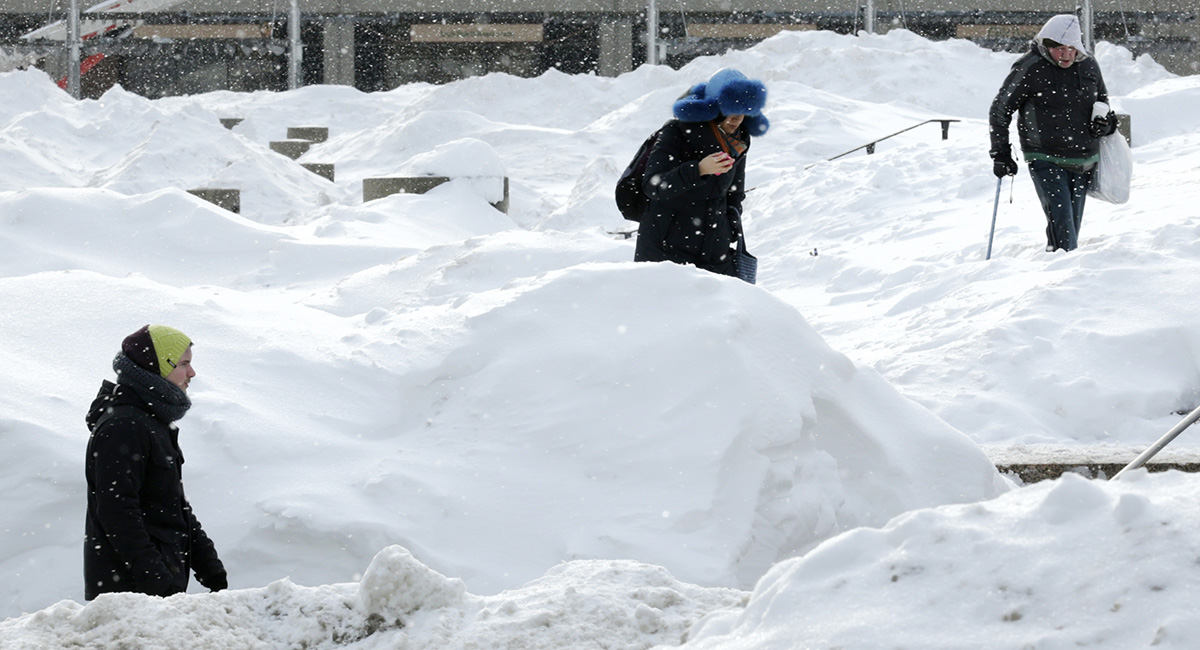
Boston City Hall Plaza on Tuesday, Feb. 17, 2015. AP Photo/Charles Krupa
Let It Snow…and Snow….and Snow
The snowiest February in history. The highest all-time seasonal snowfall total. The fastest 6-foot snowfall. The most money ever spent on snow and ice removal. The amount of records we broke in the winter of 2015 is ridiculous even by Title Town standards. After a relatively uneventful close to 2014 weather-wise, Boston was walloped in late January by Winter Storm Juno, which dropped 24.6 inches of powder on the city and became the sixth heaviest snowstorm the city had ever seen. Less than two weeks later, Winter Storm Marcus rolled in and pounded the city with snow for four days, bumping the 30-day snowfall total to 73.3 inches. By March 15, we were surrounded by towering dirty snow piles, our boots were permanently damp, Boston Public School students were scheduled to be in class until June 30, and we had seen 108.6 inches of snow over the course of the season. It was the winter that sent newcomers running for milder climes and a Yeti running through the streets—but this raging snowy season also shed light on some critical problems in Boston that didn’t go away when the snow finally melted (in July, for the record). Namely:

Weary by James Wang on Flickr/Creative Commons
The T Could No Longer Be Trusted
To say that the MBTA imploded during #snowmageddon would be an understatement. As inch after inch of snow fell on the aged tracks, crews worked diligently around the clock, but it all eventually proved to be too much for the nation’s oldest subway system. The general manager of the MBTA, Beverly Scott, abruptly resigned February 11 amid backlash on the system’s failures. There were widespread cancellations and delays on both the commuter rail and subway lines. 48 passengers were stranded for over two hours on the Red Line, with some eventually walking in the snow to shuttle buses. Rail service was completely suspended for two days. The MBTA’s problems started far before 2015, for sure—but watching our entire public transit infrastructure crumble that winter was the breaking point for many.
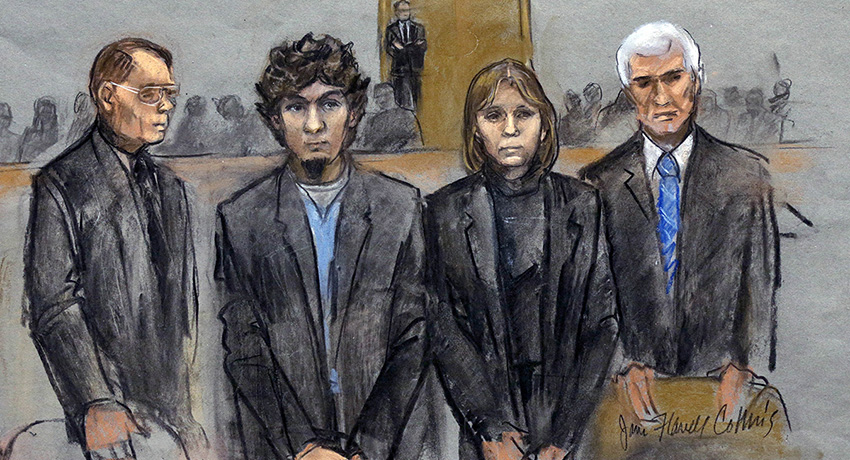
Jane Flavell Collins via AP
A Bomber Is Sentenced
Two years after helping plant the pressure cooker bomb that killed 3 and wounded over 250, Dzhokar Tsarnaev was given the death penalty, the first time since 9/11 that a federal jury had sentenced a terrorist to death. While the defense assembled a case centered around the idea that Tsarnaev’s deceased older brother, Tamerlan, had pressured him into participating in the bombings, the jury still found the 21-year-old guilty of all 30 charges levied against him for the bombing after just an 11-hour deliberation period. As is the case in most capital sentences, however, Tsarnaev has appealed. His lawyers will appear in court this month to argue that the trial was unfair because it was held in Boston, where it was, they claim, virtually impossible to assemble an impartial jury.

Photo via State Police on Twitter
An Infamous I-93 Protest
A year after the high-profile deaths of Michael Brown, Eric Garner, and Tamir Rice at the hands of white police officers, local members of the Black Lives Matter movement staged a peaceful, yet high profile, protest—chaining themselves to 1200 pound barrels of concrete in the middle of I-93. In a coordinated surprise demonstration, protesters formed human barricades and blocked the city’s biggest highway, just in time for the Thursday morning commute. The protest was, unsurprisingly, met with a frosty reception from drivers, some of whom exited their vehicles in the standstill traffic to yell at protesters. Mayor Marty Walsh and Governor Charlie Baker also expressed disapproval, inviting activists to speak with them directly rather than protesting. While the protesters had been removed and the roads were opened back up to traffic by 9:45 a.m. that morning, the nationwide discourse on police brutality was far from over. In 2015, over 1,000 people were killed by police officers, with young black men getting killed at a rate five times higher than that of their white male peers.
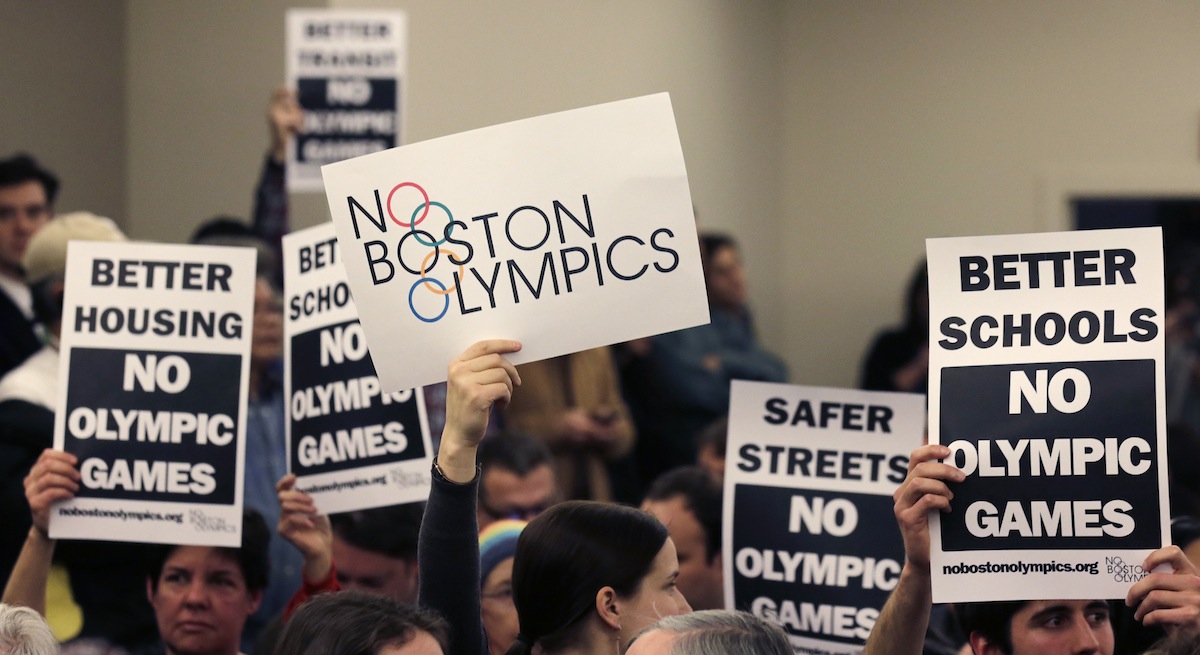
AP Photo/Charles Kroupa
The Olympic Bid’s Death Rattle
Good riddance. Playing host to the Olympics would finally earn Boston a seat among the world-classiest cities, we were told, and for two years, it felt like the organizers of Boston’s 2024 Olympics bid were somehow always releasing flashy new renderings of the supposed venue while battling new controversies. Eventually, it became clear that the interests of citizens and the interests of the United States Olympic Committee just weren’t compatible, to say the least, and 2015 was finally the year that killed the bid.
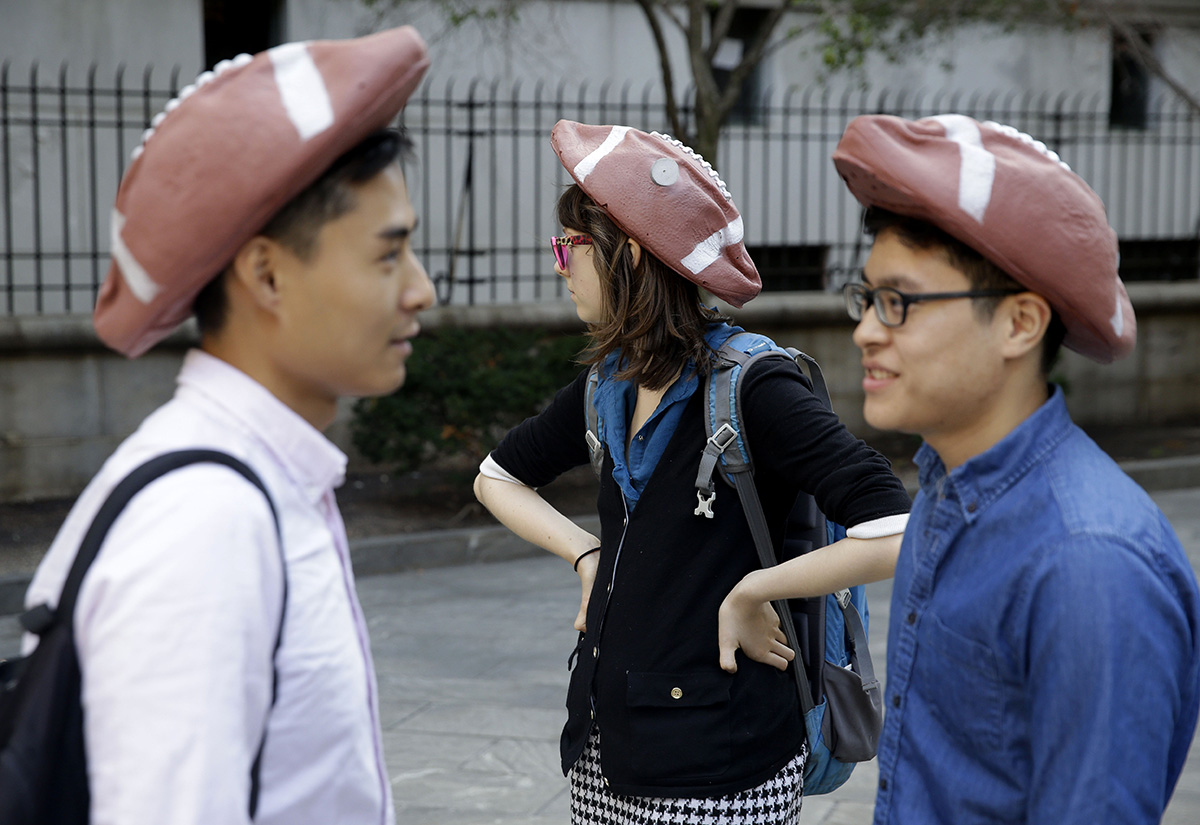
Photo via AP
The Nation’s Football Fans Became Armchair Scientists
We all remember how this $22.5 million fiasco played out. The Pats faced off against the Indianapolis Colts in the AFC Championship, the Brady/Edelman/Gronkowski dream team led the boys to victory, and then—18 months of crisis press conferences, conspiracy theories, and jokes about both balls and gas were set into motion when an equipment manager revealed one of the game balls was returned to him feeling rather…squishy. All of a sudden, the entire country was pointing fingers at New England, saying that Brady was wholly aware that the balls had been deflated and calling for him to face the consequences. Belichick chalked the suspicious PSI up to the “rubbing process.” MIT professors eagerly explained the Ideal Gas Law. The late night shows had weeks worth of fodder. Finally, after months of backroom arguments and negotiations, a courtroom battle, and an appeal, NFL commissioner Roger Goodell eventually handed Brady a four game suspension. The kids all had their fun, sure—but even a scandal of this magnitude couldn’t take the Ideal Gas out of this Pats season. Ultimately, TB12’s little tryst with the law was overshadowed by:

AP Photo/Kathy Willens, File
The Super Bowl Comeback That Dreams Are Made Of
It seemed like the Seahawks had this one on lock. Going into the fourth quarter, the Pats were down 24-14, and no team in Super Bowl history had ever won after facing a final-quarter deficit of over 7 points. But, through the power of the football gods summoned by Left Shark’s halftime show dance, the Pats came back. In an unbelievable play with 20 seconds left, unknown cornerback Malcom Butler clinched the game with a goal line interception, setting up a Pats victory and launching himself to stardom. The Patriots walked away with a 28-24 win over the Seahawks and their fourth Super Bowl title. This year, the NFL Network named it the eighth-greatest game in the league’s history.
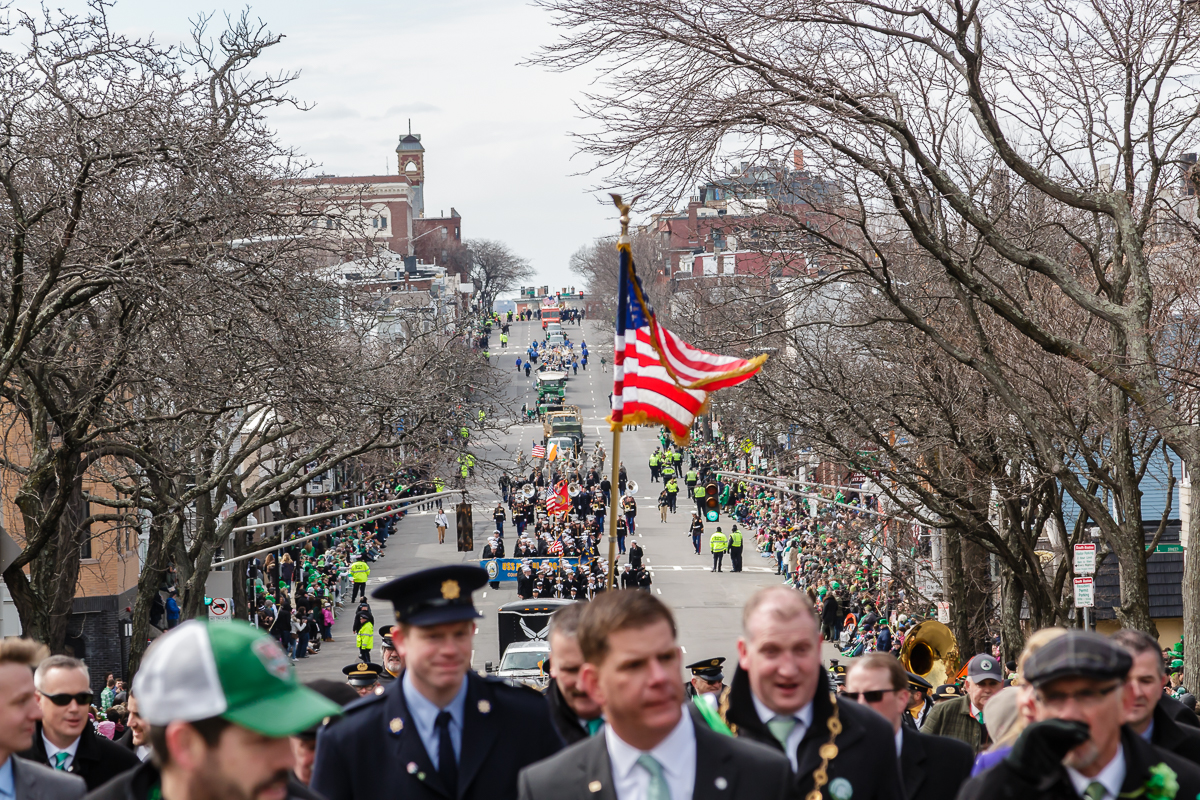
Photo provided
Strides for Equality on St. Patrick’s Day
After the U.S. Supreme Court upheld the ban on LGBTQ groups in the St. Patrick’s Day Parade in 1995, Boston’s mayors, in protest, opted out of appearing at the parade. In 2015, however, the parade finally lifted its ban, and Marty Walsh made history by becoming the first mayor in 20 years to participate in the longstanding Southie tradition, walking alongside Boston Pride and OutVets. Yes, the parade route was cut nearly in half due to snow-covered roads—but it was a milestone worth celebrating nevertheless.

David Ortiz photo by Keith Allison via Flickr/Creative Commons
A Slugger’s Swan Song
While it was his 40th birthday, David Ortiz was the one who surprised us—by announcing his intentions to retire at the end of the 2016 season. “I thought a lot about it,” Ortiz said at the time. “Every single one of us, athletes-wise, we run out of time at some point. Life is based on different chapters and I think I’m ready to experience the next one in my life.” Boston’s favorite slugger guided the Red Sox to victory three times over his tenure on the team, and retired at the peak of his game, producing 37 homers and 108 RBIs in 2015.
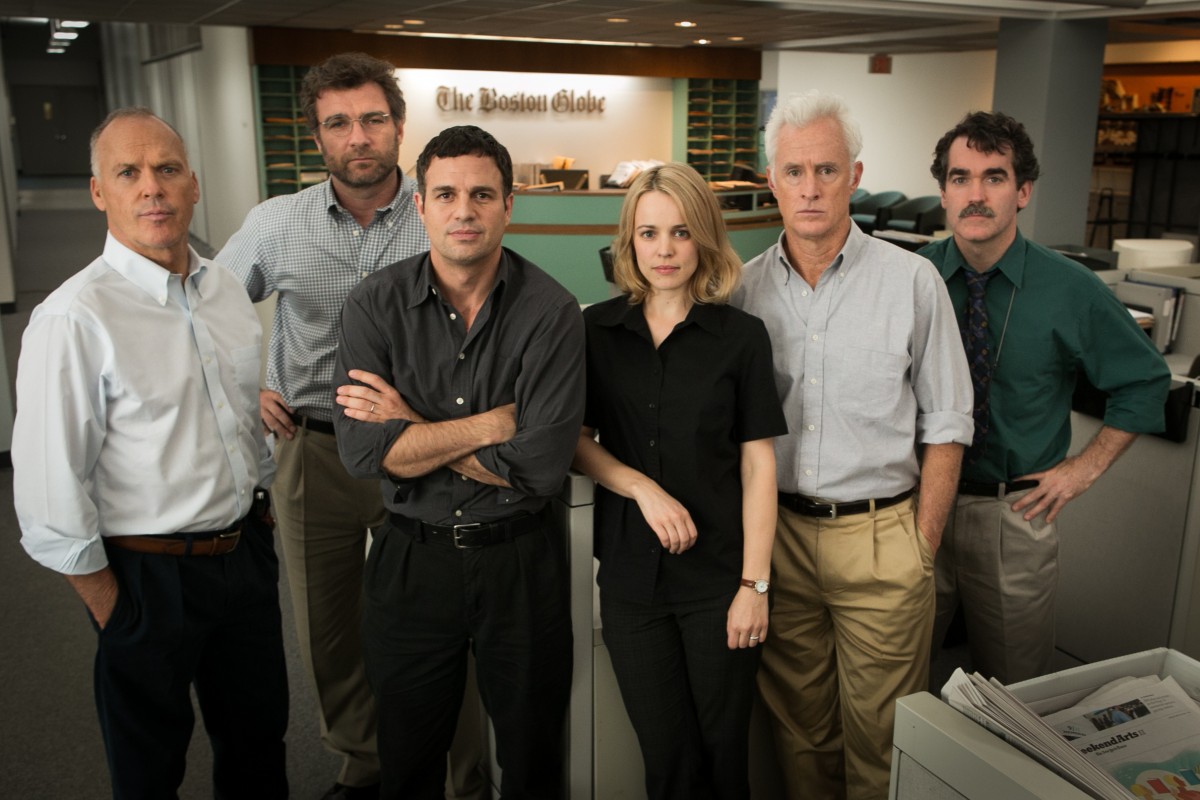
Photo by Kerry Hayes / Open Road Films / Photo by Kerry Hayes / Open Road Films
A Soon-to-Be Best Picture Hits the Silver Screen
Rolling Stone called it the best film about reporting since All the President’s Men. The story of how the Boston Globe‘s Spotlight team unraveled a sweeping sex abuse scandal in the Catholic Church, starring Mark Ruffalo, Michael Keaton, and Rachel McAdams, was an instant hit among critics and moviegoers alike. For Bostonians, it’s a hard film to resist. While Spotlight certainly belongs among the ranks of great journalism movies, its intimate knowledge of Boston—from its Catholic culture, to the class structure, to its neighborhood divides—also place it on the shortlist of best movies about this city. And, even four years ago, a film about the power of long-form, local print journalism felt prescient in a time when we were already seeing local news outlets go the way of the dinosaur.


